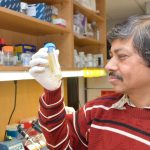Swapan K. Nath, Ph.D.
Professor
Arthritis & Clinical Immunology Research Program
William H. & Rita Bell Chair in Biomedical Research
Adjunct Professor, Department of Pediatrics and Department of Pathology, University of Oklahoma Health Sciences Center
My 101
Almost every common and complex disease has a genetic basis. In other words, complex diseases are defined as diseases that are ultimately determined by a number of genetic and environmental factors. Therefore, identification of the genes is a prerequisite to understanding the biological basis of the disease. In my lab, we primarily focus on identifying and studying genes associated with lupus—an autoimmune disease in which the body’s immune system attacks the body’s own cells.
Lupus is a complex disease, so there are many combinations of genes and environmental factors that can cause it. In our genome, we have about 25,000 genes. By finding out what genes contribute to the disease, we can better understand how lupus starts. One way we do that is called “gene-mapping.” We take DNA samples from a large group of patients with lupus and compare them to DNA samples of people without lupus. Then we try to pinpoint DNA variations that show us which genetic difference are related to the disease. The statistical analyses are vital and necessary components of any gene-mapping effort.
A few years ago, this kind of work would have been impossible, because the technology to study the DNA variations efficiently did not exist. In each individual, we have to work with millions of data-points to draw a meaningful conclusion. It is still not easy, but now we have several analytical methods and computational techniques, along with faster and sophisticated machines, to help us do it.
The goal of all of this is to find the genes responsible for causing diseases and learn what they do. Then we can work on new ways to treat disease.
Research
For disorders with a poorly understood biochemical basis, identification of the genes is a prerequisite to understanding the biological basis of the disease. Therefore, identification of genes contributing to disease susceptibility helps us understanding the development and pathogenesis of these diseases.
Statistical analyses are vital and necessary components of any gene-mapping effort. Approaches to map and identify disease genes vary according to the research question, the population, and the disease under analysis. These methods include various genetic-epidemiological methods like linkage analysis, segregation analysis, candidate gene analysis, association mapping, admixture mapping, population genetics and meta-analysis.
The central focus of my research is to study the genetic epidemiology of complex diseases in which the inheritance does not follow clear-cut Mendelian fashion. These studies involve analyses of large numbers of phenotypically well-characterized families and case-control samples. The advent of new molecular genetic technologies makes the mapping and identification of susceptibility genes, and their interactions with other genes and environmental factors feasible. The disease in which we are mostly interested is systemic lupus erythematosus (SLE), an autoimmune disease and non-syndromic cleft lip with or without cleft palate (NSCLP).
We have conducted several genome scans for to identify chromosomal regions likely to harbor SLE susceptibility genes. Additionally, we are looking at candidate genes in the linked and other chromosomal regions for association with the disease. Currently, my lab is actively involved in the positional cloning and identification of major SLE susceptibility genes at 2q22-24, 5p15, 12q24, 16p12-q13 and Xq28 by combining data from linkage and allelic association from studies that differ in population, phenotype definition and ascertainment. We are also performing mapping by admixture linkage disequilibrium (MALD), a powerful and cost effective method to map the genes with low-penetrant risk. The key advantage of MALD is that a small number of ancestry informative markers are sufficient to map these SLE susceptibility loci. At present, we are applying MALD techniques to the study of African-American populations.
NSCLP is one of the most common craniofacial malformations. Both genetic and environmental factors are involved in the pathogenesis. Recently, based on a high-density genome scan, we have identified 13q33.1-p34 as a novel NSCLP susceptibility region. Fine mapping is underway to identify the actual susceptibility gene.
Brief CV
Education
M.Sc., University of Calcutta, India, 1989
Ph.D., Indian Statistical Institute, Calcutta, India, 1995
Postdoc, Case Western Reserve University, Cleveland, OH, 1995-2000
Honors and Awards
Recipient of National Eligibility Test Lectureship, conducted by University Grant Commission, India, 1990
Recipient of Indian Statistical Institute Fellowship, 1990
Recipient of the Young Scientist Award in Population Genetics, Indian Society of Human Genetics, 1993
Recipient of Travel Grant Award, Federation of Clinical Immunology Societies, 2002
The Merrick Award for Outstanding Research, 2006
J. Donald and Patricia H. Capra Distinguished Scientist, 2008
Recipient of Travel Grant Award, Federation of Clinical Immunology Society, 2013, 2014
Edward L. and Thelma Gaylord Prize for Scientific Excellence, 2016
William H. and Rita Bell Chair in Biomedical Research, 2018
Recipient of Travel Grant Award, Federation of Clinical Immunology Society, 2019
Director, Oklahoma Federation of Clinical Immunology Society (FOCiS) Center of Excellence, June 2024 - Present
Other Activities
Ad hoc reviewer for Scientific Journals (in alphabetical order): American Journal of Human Genetics, Arthritis & Rheumatology, Arthritis Research & Therapy, Autoimmune Diseases, Bioinformatics, Central European Journal of Immunology, G3:Genes,Genomics,Genetics, Genetic Epidemiology, Human Genetics, Human Immunology, Human Molecular Genetics, International Journal of Immunogenetics, International Journal of Rheumatology, Journal of Autoimmunity, Journal of Investigative Dermatology, Journal of Rheumatology, Lupus Science & Medicine, Nature Genetics, Pediatric Nephrology, PLOS Genetics, PLOS One, Rheumatology, Scientific Reports, Tissue Antigen, Translational Research
Memberships
American Society of Human Genetics
International Genetic Epidemiology Society
Federation of Clinical Immunology Society
The American Association of Immunologists
American College of Rheumatology
New York Academy of Sciences
Joined OMRF scientific staff in 2000
Publications
Recent Publications
Liu Y, Gan T, Qi YY, Tan M, Xu LL, Li Y, Liu J, Qu S, Wang L, Chen G, Lv JC, Zhao ZZ, Bi W, Zhang P, Zhao MH, Tan Y, Nath SK, Zhang H, Zhou XJ. Genetic susceptibility to membranous lupus nephritis: a genome-wide association study. Ann Rheum Dis, 2025 June, PMID: 40537343
Radhakrishna U, Kuracha MR, Hamzavi I, Saiyed N, Prajapati J, Rawal RM, Uppala LV, Damiani G, Ratnamala U, Nath SK. Impaired Molecular Mechanisms Contributing to Chronic Pain in Patients with Hidradenitis Suppurativa: Exploring Potential Biomarkers and Therapeutic Targets. Int J Mol Sci 26, 2025 January, PMID: 39940809, PMCID: PMC11817842
Rallabandi HR, Singh MK, Looger LL, Nath SK. Defining Mechanistic Links Between the Non-Coding Variant rs17673553 in CLEC16A and Lupus Susceptibility. Int J Mol Sci 26, 2025 January, PMID: 39796169, PMCID: PMC11720054
Selected Publications
Molineros JE, Singh B, Terao C, Okada Y, Kaplan J, McDaniel B, Akizuki S, Sun C, Webb CF, Looger LL Nath SK. Mechanistic Characterization of RASGRP1 Variants Identifies an hnRNP-K-Regulated Transcriptional Enhancer Contributing to SLE Susceptibility. Front Immunol. 2019 May 20;10:1066. doi: 10.3389/fimmu.2019.01066. eCollection 2019. PMID: 31164884, PMCID: PMC6536009
Molineros JE, Looger LL, Kim K, Okada Y, Terao C, Sun C, Zhou XJ, Raj P, Kochi Y, Suzuki A, Akizuki S, Nakabo S, Bang SY, Lee HS, Kang YM, Suh CH< Chung WT, Park YB, Choe JY, Shim SC, Lee SS, Zuo X, Yamamoto K, Li QZ, Shen N, Porter LL, Harley JB, Chua KH, Zhang H, Wakeland EK, Tsao BP, Bae SC, Nath SK. Amino Acid Signatures of HLA Class-I and II Molecules are Strongly Associated with SLE Susceptibility and Autoantibody Production in Eastern Asians. PLoS Genet. 2019 Apr 25;15(4):e1008092. doi: 10.1371/journal.pgen.1008092. eCollection 2019 Apr. PMID: 31022184, PMCID: PMC6504188
Molineros JE, Yang W, Zhou XJ, Sun C, Okada Y, Zhang H, Heng-Chua K, Lau YL, Kochi Y, Suzuki A, Yamamoto K, Ma J, Bang SY, Lee HS, Kim K, Bae SC, Zhang H, Shen N, Looger LL, Nath SK. Confirmation of five novel susceptibility loci for systemic lupus erythematosus (SLE) and integrated network analysis of 82 SLE susceptibility loci. Hum Mol Genet. 2017 Mar 15;26(6):1205-16. PMID: 28108556 PMCID: PMC5731438
Sun C, Molineros JE, Looger LL, Zhou XJ, Kim K, Okada Y, Ma J, Qi YY, Kim-Howard X, Motghare P, Bhattarai K, Adler A, Bang SY, Lee HS, Kim TH, Kang YM, Suh CH, Chung WT, Park YB, Choe JY, Shim SC, Kochi Y, Suzuki A, Kubo M, Sumida T, Yamamoto K, Lee SS, Kim YJ, Han BG, Dozmorov M, Kaufman KM, Wren JD, Harley JB, Shen N, Chua KH, Zhang H, Bae SC, Nath SK. High-density genotyping of immune-related loci identifies new SLE risk variants in individuals with Asian ancestry. DOI: 10.1038/ng.3496. Nat Genet. 2016 Mar;48(3):323-30. Epub 2016 Jan 25. PMID: 26808113 PMCID: PMC4767573
Kim-Howard X, Sun C, Molineros JE, Maiti AK, Chandru H, Adler A, Wiley GB, Kaufman KM, Kottyan L, Guthridge JM, Rasmussen A, Kelly J, Sanchez E, Raj P, Li QZ, Bang SY, Lee HS, Kim TH, Kang YM, Suh CH, Chung WT, Park YB, Choe JY, Shim SC, Lee SS, Han BG, Olsen NJ, Karp DR, Moser K, Pons-Estel BA, Wakeland EK, James JA, Harley JB, Bae SC, Gaffney PM, Alarcón-Riquelme M, on behalf of GENLES, Looger LL, Nath SK. Allelic heterogeneity in NCF2 associated with systemic lupus erythematosus (SLE) susceptibility across four ethnic populations. Hum Mol Genet. 2014 Mar 15;23(6):1656-68. PMID: 24163247 PMCID: PMC3929085
Molineros JE, Maiti AK, Sun C, Looger LL, Kim-Howard X , Glenn S, Adler A, Han S, Kelly JA, Niewold TB, Gilkeson GS, Brown EE, Alarcón GS, Edberg JC, Petri M, Ramsey-Goldman R, Reveille JD, Vilá LM, Freedman BI, Tsao BP, Criswell LA, Jacob CO, Moore JH, Vyse TJ, Langefeld CL, Guthridge JM, Gaffney PM, Moser KL, Scofield RH, Alarcón-Riquelme ME, on behalf of the BIOLUPUS Network, Williams SM, Merrill JT, James JA, Kaufman KM, Kimberly RP, Harley JB, Nath SK. Admixture Mapping in Lupus Identifies Multiple Functional Variants within IFIH1 Associated with Apoptosis, Inflammation and Autoantibody Production. PLoS Genet. 2013;9(2):e1003222. PMID: 23441136 PMCID: PMC3575474
Contact
Arthritis & Clinical Immunology Research Program, MS 71
Oklahoma Medical Research Foundation
825 N.E. 13th Street
Oklahoma City, OK 73104
Phone: (405) 271-7765
Fax: (405) 271-4110
E-mail: Swapan-Nath@omrf.org
For media inquiries, please contact OMRF’s Office of Public Affairs at news@omrf.org.
Lab Staff
Lily Wong, Ph.D.
Staff Scientist
Alsamman Alsamman, Ph.D.
Assistant Staff Scientist
Manish Kumar Singh, Ph.D.
Assistant Staff Scientist
Muhammad Adeel, Ph.D.
Assistant Staff Scientist
Celi Sun
Senior Data Analyst
Louise Williamson
Finance and Administrative Specialist
News from the Nath lab
OMRF has received a $10 million grant from the National Institutes of Health to study the autoimmune disease lupus. The five-year award comes from the National Institute of Allergy and Infectious Diseases at the NIH. The grant will support research on the genetic origins of lupus, which affects up to an estimated 2 million Americans […]
An international consortium of scientists led by OMRF investigator John B. Harley, M.D., Ph.D., has identified multiple genes linked to lupus, a devastating autoimmune disease that affects as many as 2 million Americans and 15 million people worldwide. The group’s findings appear online in two related articles in the Feb. edition of the journal Nature […]
At its semiannual board meeting Thursday, the Oklahoma Medical Research Foundation added two new members to its board of directors: Tulsa Mayor Kathryn Taylor and James Morris II, a retired Oklahoma City insurance executive. The board also honored OMRF researchers Swapan Nath, Ph.D., and Fletcher Taylor Jr., M.D. An attorney, Kathryn Taylor began her legal […]


















